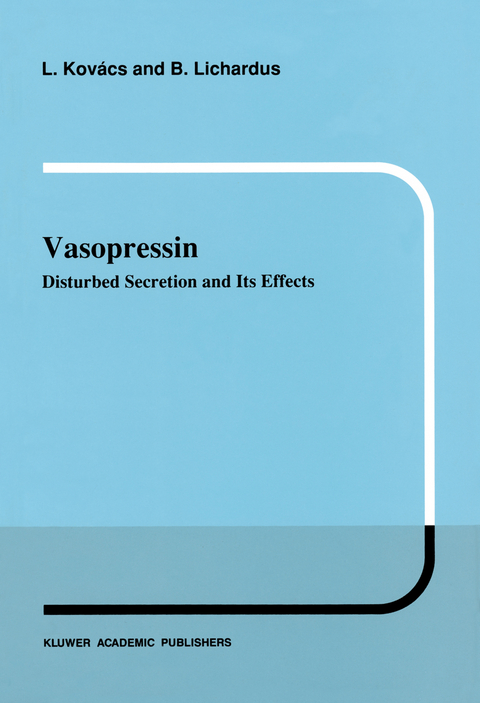
Vasopressin
Springer (Verlag)
978-0-7923-0249-0 (ISBN)
- Titel z.Zt. nicht lieferbar
- Versandkostenfrei
- Auch auf Rechnung
- Artikel merken
1 Basal mechanisms of water-salt homeostasis.- 1.1 Body water distribution and osmotic concentration.- 1.2 Balance state.- 1.3 Regulation of extracellular fluid volume (the control of sodium balance).- 1.4 Regulation of extracellular fluid osmolality (the control of water balance).- 2 Hypothalamo-neurohypophyseal hormones and neurophysins.- 2.1 Arginine-vasopressin (AVP) and lysine-vasopressin (LVP).- 2.2 Oxytocin (OT).- 2.3 Other naturally occurring nonapeptides in mammals.- 2.4 Neurohypophyseal peptides without established hormonal activity.- 3 Neurosecretion.- 3.1 Neural organization of the vasopressinergic system.- 4 Biosynthesis, transport and release of vasopressin.- 4.1 Structural organization of vasopressin gene.- 4.2 Posttranslational processing of the vasopressin precursor.- 4.3 Regulation of the vasopressin gene expression.- 4.4 The Brattleboro rat — an animal model of hereditary neurogenic (central) diabetes insipidus.- 4.5 Vasopressin release from the neurohypophysis.- 5 Regulation of vasopressin secretion and thirst.- 5.1 Osmoreceptor mediated regulation of vasopressin and thirst.- 5.2 Functional properties of the osmoregulatory system regulating thirst.- 5.3 Functional relationship between osmotically stimulated AVP secretion and thirst.- 5.4 Nonosmotic regulation of vasopressin secretion.- 6 Vasopressin assays.- 6.1 Bioassays.- 6.2 Radioimmunoassays (RIA).- 6.2.1 Vasopressin in plasma.- 6.2.2 Vasopressin in urine.- 6.2.3 Vasopressin in cerebrospinal fluid.- 7 Receptors and synthetic analogs of vasopressin.- 7.1 Vasopressin receptors.- 7.2 Regulation of vasopressin receptors.- 7.3 Synthetic analogs of vasopressin.- 8 Vasopressin and renal regulation of water homeostasis.- 8.1 Renal osmoregulatory performance —the osmotically free water concept.- 8.2Renal actions by which vasopressin may affect the concentration of urine.- 8.3 Urinary concentration.- 8.4 Clinical evaluation of renal concentrating performance.- 8.5 Urine dilution and its disturbances.- 9 Vasopressin in circulatory control.- 9.1 Vasopressin-induced peripheral vasoconstriction.- 9.2 Blood pressure.- 9.3 Effects on the central nervous system.- 9.4 Role of vasopressin in blood pressure maintenance.- 10 Vasopressin and hemostasis.- 10.1 Vasopressin and factor VIII complex.- 10.2 Vasopressin and fibrinolysis.- 10.3 Vasopressin and platelet function.- 10.4 Clinical experience with desmopressin in the treatment of various bleeding disorders.- 11 Vasopressin and anterior pituitary function.- 11.1 Vasopressin and adrenocorticotropic hormone (ACTH) release.- 11.2 Vasopressin and other anterior pituitary hormones.- 12 Vasopressin and brain function.- 12.1 Vasopressin in cerebrospinal fluid.- 12.2 Vasopressin and memory.- 13 Metabolic effects of vasopressin.- 14 Clinical disturbances of vasopressin secretion and effects (hypo- and hyper-vasopressinism).- 14.1 Hypovasopressinism.- 14.2 Hypervasopressinism.- 14.3 Role of water intake and fluid therapy.- 14.4 Iatrogenic disturbances in body water homeostasis.- 15 Ontogenesis of body water homeostasis and vasopressin secretion.- 15.1 Fetal neurohypophyseal function.- 15.2 Vasopressin during the labor.- 15.3 Regulation of body water homeostasis and vasopressin secretion in newborns and young infants.- 15.4 Arginine-vasopressin during the immediate postnatal period.- 15.5 Development of vasopressin secretion from birth to adulthood.- 15.6 Circadian variations of vasopressin secretion and nocturnal enuresis in children.- 16 Renal water handling, vasopressin secretion and thirst sensation in the elderly.- 16.1 Aging and renal function.- 16.2 Aging and vasopressin secretion.- 16.3 Aging and thirst.- 17 Clinical syndromes associated with hypovasopressinism.- 17.1 Disturbed vasopressin secretion (central diabetes insipidus, CDI).- 17.2 Nephrogenic diabetes insipidus (NDI).- 17.3 Disturbed osmoregulation of thirst and vasopressin secretion (hypovasopressinism without polyuria; essential hypernatremia).- 17.4 Increased thirst with secondary hypovasopressinism — polydipsic diabetes insipidus, PDI.- 17.5 Differential diagnosis of polyuric syndromes.- 18 Hypertonic syndromes.- 18.1 Hypertonicity and the central nervous system.- 18.2 Hypernatremia.- 18.3 Treatment of hypernatremia.- 19 Hypervasopressinism.- 19.1 Causes of hypervasopressinism.- 19.2 Hypervasopressinism — is it always inappropriate?.- 20 The hypotonic syndrome.- 20.1 Non-hypotonic hyponatremias.- 20.2 Hypotonicity and the central nervous system.- 20.3 Hypotonic (“true”) hyponatremia.- 20.4 Treatment of hyponatremia.- List of abbreviations.- References.
| Erscheint lt. Verlag | 30.4.1990 |
|---|---|
| Reihe/Serie | Developments in Nephrology ; 25 |
| Zusatzinfo | XIV, 296 p. |
| Verlagsort | Dordrecht |
| Sprache | englisch |
| Themenwelt | Medizinische Fachgebiete ► Innere Medizin ► Diabetologie |
| Medizinische Fachgebiete ► Innere Medizin ► Nephrologie | |
| Medizinische Fachgebiete ► Innere Medizin ► Pneumologie | |
| Medizin / Pharmazie ► Medizinische Fachgebiete ► Pädiatrie | |
| ISBN-10 | 0-7923-0249-4 / 0792302494 |
| ISBN-13 | 978-0-7923-0249-0 / 9780792302490 |
| Zustand | Neuware |
| Informationen gemäß Produktsicherheitsverordnung (GPSR) | |
| Haben Sie eine Frage zum Produkt? |
aus dem Bereich


